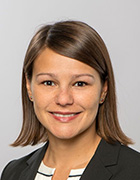
Prof. Dr. Julijana Gjorgjieva
Academic Career and Research Areas
Professor Gjorgjieva (b. 1983) conducts research in the fields of computational and theoretical neuroscience. She is interested in how brain circuits become tuned to maintain a balance between constant change as we learn new things, and robustness to produce reliable behavior. In particular, she concentrates on two aspects of neural circuit organization, looking at how it emerges from the interaction of neuronal and synaptic properties during development, and from optimality and energy conservation principles that operate over the longer timescales of evolution.
Professor Gjorgjieva studied mathematics at Harvey Mudd College in California, USA. After obtaining a PhD in Applied Mathematics at the University of Cambridge in 2011, she spent five years in the USA as a postdoctoral research fellow at Harvard University and Brandeis University, supported by grants from the Swartz Foundation and the Burroughs-Wellcome Fund. In 2016, she set up an independent research group at the Max Planck Institute for Brain Research in Frankfurt and joined TUM as an assistant professor shortly after as part of the MaxPlanck@TUM program. She received tenure and joined TUM as a full professor in 2022. She is also a member of the Bernstein Center for Computational Neuroscience in Munich.
Awards
- Eric Kandel Young Neuroscientists Prize (2021)
- FENS-Kavli Network of Excellence Scholar (2021)
- ERC Starting Grant (2018)
- Peter und Traudl Engelhorn Foundation, Research Prize “Computational Biology” (2018)
- NARSAD Young Investigator Award (2017)
Key Publications (all publications)
J. H. Kirchner and J. Gjorgjieva (2021). Emergence of local and global synaptic organization on cortical dendrites. Nature Communications 12, 4005.
AbstractA. Schulz*, C. Miehl*, M. J. Berry II and J. Gjorgjieva (2021). The generation of cortical novelty responses through inhibitory plasticity. eLife 10, e65309. (* indicates equal contribution)
AbstractK. Röth, S. Shao and J. Gjorgjieva (2021). Efficient population coding depends on stimulus convergence and source of noise. PLoS Comp Biol 17(4): e1008897.
AbstractM. E. Wosniack, J. H. Kirchner, L.-Y. Chao, N. Zabouri, C. Lohmann and J. Gjorgjieva (2021). Adaptation of spontaneous activity in the developing visual cortex. eLife 10:e61619.
AbstractY. Wu, K. B. Hengen, G. G. Turrigiano and J. Gjorgjieva (2020). Homeostatic mechanisms regulate distinct aspects of cortical circuit dynamics. Proc Natl Acad Sci USA 117 (39) 24514-24525.
AbstractIf you wish your profile to be changed or updated please contact Franz Langer.